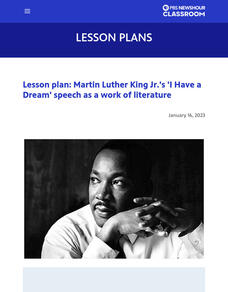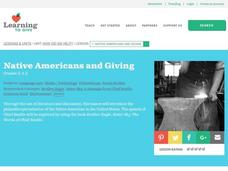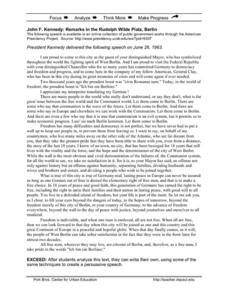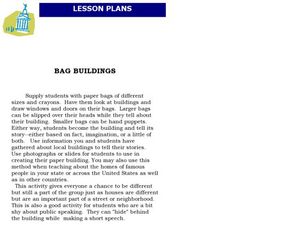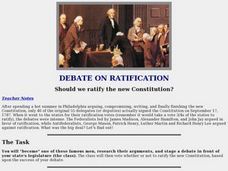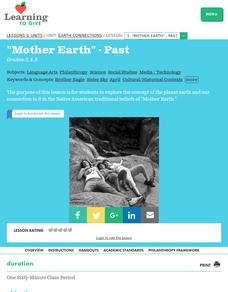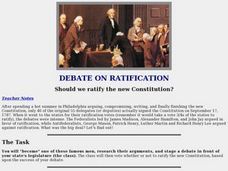ReadWriteThink
Analyzing Famous Speeches as Arguments
A speaker, a message, an audience. After analyzing these elements in Queen Elizabeth's speech to the troops at Tilbury, groups analyze how other speakers use an awareness of events, and their audience to craft their arguments....
Franklin D. Roosevelt Presidential Library & Museum
Pearl Harbor Activity #2: Why Do Words Matter?
Words matter! That's the big idea behind an activity that asks scholars to replace words in FDR's "Day of Infamy" speech with synonyms. They then listen to a recording of President Roosevelt's address and compare his version to their own.
PBS
Dr. Martin Luther King Jr.’s ‘I Have a Dream’ Speech as a Work of Literature
To appreciate the oratory of Dr. Martin Luther King Jr.'s "I Have a Dream" speech, scholars examine the rhetorical devices and influences that make the speech so famous. They examine background information, conduct a close reading of the...
Curated OER
Native Americans and Giving
Students explore the concept of philanthropy. In this Brother Eagle, Sister Sky: The Words of Chief Seattle lesson, students examine the plight of Native Americans and explore Native Americans' quest for the "common good."
Polk Bros Foundation
John F. Kennedy: Remarks in the Rudolph Wilde Platz, Berlin
“Ich bin ein Berliner.” Here’s the full text of John F. Kennedy’s famous address delivered to the people of Berlin on June 26, 1963. The resource could be used as part of a study of Kennedy’s presidency, of rhetorical devices, or as...
Curated OER
An Ideal for Which I Am Prepared to Die
English language learners have an opportunity to closely examine the academic language in portions of Nelson Mandela's famous 1964 Court Speech, "An Ideal for Which I Am Prepared to Die," with a activity that looks at key passages from...
Curated OER
Wall of Philanthropists: King Day (7th)
Pupils recognize the importance of justice, tolerance, equality, and historical figures. In this philanthropic actions lesson, students study the philanthropic actions of historical figures, and learn about the concepts of fairness,...
Curated OER
Sojourner Truth
Students research Sojourner Truth. In this African-American history lesson, students read the speech "Ain't I A Woman?" and brainstorm descriptive words that describe Sojourner Truth. Students discuss why her acts were considered...
Curated OER
Bag Buildings
Students create building from paper bags. In this building lesson, students draw buildings on different size paper bags. They wear these bags on their heads or hands and tell the story of the building.
Curated OER
Civil Rights Leaders
Tenth graders investigate three American leaders from the Civil Rights Movement while they examine the early 1960's and the topic of racial equality. They listen to music from the era, read speeches, and look at images of Martin Luther...
Curated OER
African American History
In this African American History activity, students conduct research to find the answer to 10 questions about famous African Americans.
Curated OER
Debate on Ratification: Should We Ratify the New Constitution?
Students determine whether the Constitution should be ratified. In this U.S. Constitution lesson plan, students research the roles of famous Federalists and Antifederalists in order to prepare them to participate in a classroom...
Curated OER
"Mother Earth" -- Past
Students examine our connection to the Earth. They identify how Native Americans believed in a "Mother Earth". They discover how the earth and life are connected.
Curated OER
Omaha Immigration Case Study
Eleventh graders explore the immigration patterns in the United States. In this American History instructional activity, 11th graders study the push and pull factors that caused immigration. Students research one group of...
Curated OER
Debate On Ratification
Middle schoolers simulate a delegate that was responsible for the Constitution. They research their arguments, and stage a debate in front of the state's legislature (the class). The class then vote whether or not to ratify the new...




